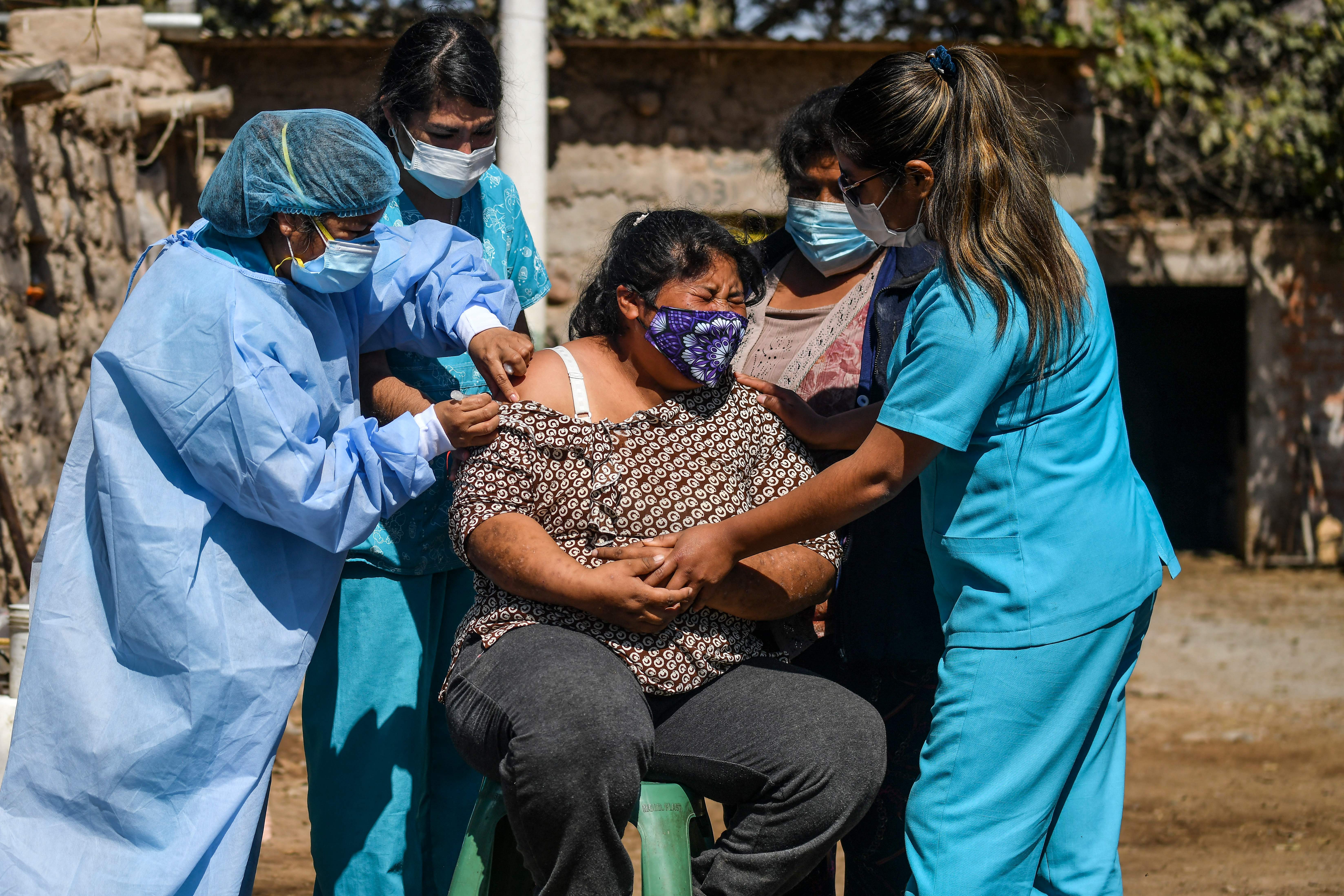Here’s what you need to know about the lambda Covid variant

Health workers inoculate a woman in Peru.
DIEGO RAMOS | AFP | Getty Images
More than 18 months into the Covid-19 pandemic and the world is used to news of new variants of the virus by now, particularly those that have, one by one, supplanted previous versions of the disease.
Some mutations of the virus, like the alpha variant and the delta variant — discovered first in the U.K. and India, respectively — have been more transmissible than previous iterations of the virus and have gone on to dominate globally. Whenever a new variant of the coronavirus emerges, scientists watch it closely.
While the world is still contending with the rapid spread of the delta variant, which has usurped the alpha variant in terms of transmissibility and the potential to cause hospitalizations in unvaccinated people, there is now a new variant that experts are monitoring: The lambda variant.
Here’s what we know (and don’t know) about it:
What is the lambda variant?
The lambda variant, or “C.37” as the lineage has been designated, has been spreading rapidly in South America, particularly in Peru where the earliest documented samples of the virus date from August 2020.
However, it was only flagged up as a “variant of interest” by the World Health Organization on June 14 this year as cases attributed to the variant had spread noticeably.
In its report in mid-June, the WHO reported that “lambda has been associated with substantive rates of community transmission in multiple countries, with rising prevalence over time concurrent with increased Covid-19 incidence” and that more investigations would be carried out into the variant.
Where is it exactly?
The WHO noted in its June 15 report that the lambda variant had been detected in 29 countries, territories or areas in five WHO regions, although it has a stronger presence in South America.
“Authorities in Peru reported that 81% of Covid-19 cases sequenced since April 2021 were associated with Lambda. Argentina reported increasing prevalence of Lambda since the third week of February 2021, and between 2 April and 19 May 2021, the variant accounted for 37% of the Covid-19 cases sequenced,” the WHO noted.
Meanwhile, in Chile, the prevalence of lambda has increased over time, accounting for 32% of sequenced cases reported in the last 60 days, the WHO said, adding that it was co-circulating at similar rates to the gamma variant but was “out-competing” the alpha variant in the same time period.
By June 24, the lambda variant had been detected in cases in 26 countries, according to Public Health England data. This included Chile, Argentina, Peru, Ecuador, Brazil and Colombia as well as the U.S., Canada, Germany, Spain, Israel, France, the U.K. and Zimbabwe, among others.
Is it more dangerous?
The WHO and other public health bodies are trying to understand how the variant compares to other strains of the virus, including whether it could be more transmissible and more resistant to vaccines.
In mid-June, the WHO said that “lambda carries a number of mutations with suspected phenotypic implications, such as a potential increased transmissibility or possible increased resistance to neutralizing antibodies.”
Noting the specific mutations in the spike protein (some of which have been described as unusual by experts) the WHO said that: “There is currently limited evidence on the full extent of the impact associated with these genomic changes” and further studies are needed “to better understand the impact on countermeasures [against Covid-19] and to control the spread.”
It’s important to note that the lambda variant is still one step below being designated a “variant of concern” like the alpha or delta mutations. In a press conference last week, the WHO’s technical lead on Covid-19, Dr. Maria Van Kerkhove, was asked what would need to happen for it to change its definition of the lambda variant.
“It would become a variant of concern if it has demonstrated pathways of increased transmissibility, if it has increased severity for example or if it has some kind of impact on our countermeasures,” she said.
Do vaccines work against it?
Again, more studies are needed about the effect that the lambda variant has on vaccine efficacy, particularly on vaccines widely available in the West, such as those from Pfizer-BioNTech, Moderna or Oxford-AstraZeneca.
But questions have been raised in parts of South America over the effectiveness of Chinese vaccines, which have been those deployed predominantly in the region, as cases linked to the lambda variant spread and infection rates rise alongside vaccination programs. Brazil, Chile and Peru all rely heavily on Chinese Covid vaccines Sinovac or Sinopharm but vaccination rates differ wildly across South America.




